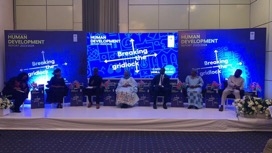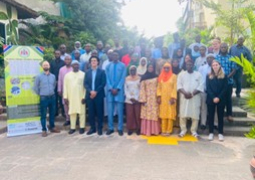
UNDP Human Development Report for the years 2023-2024 titled "Breaking the Gridlock: Reimagining Cooperation in a Polarized World" began 34 years ago as a crucial endeavour aimed at fostering collective strives through leadership on development and international collaboration.
The report holds significant insights and analysis on critical global issues, providing valuable perspectives on human development trends, challenges and opportunities.
It also sheds light on the root causes of the gridlock face and offers innovative solutions for overcoming it.
The launch event featured presentations from prominent experts and stakeholders, providing in-depth discussions on the key findings and recommendations of the Human Development Report.
In her remarks, Mandisa Moshologu, UNDP Resident Representative said the initiative seeks to address the evolving needs of both nations and the global community, recognises essential realities, seeks innovative avenues for cooperation and unity-building, spanning societal and international boundaries.
While stressing on the unprecedented challenges that confront society, ranging from economic volatility, social unrest, essence degradation, she called for considerations of implications of those challenges within The Gambian context, particularly in alignment with their new Country Programme Document (CPD 2024-2028) and The Gambia's Development Roadmap and the Recovery Focused National Development Plan.
The report she added, is particularly of essence to The Gambia and other Least Developed Countries (LDCs) globally, because it provides a blueprint for action. She added that global Human Development Index (HDI) data reveals alarming disparities among nations, indicating an unequal recovery post Covid-19 where poorer countries are being left behind, exacerbating inequalities.
“If the challenges are unchecked, the lows in human development could become permanent for the most vulnerable nations,” she also said.
Abdoulie Jallow, in his remarks on behalf of the Minister for Finance and Economic Affairs described the report as a guide and a rallying cry for The Gambia in realising the Sustainable Development Goals (SDGs) outlined in Agenda 2063.
He added that the report also highlights the crucial need to leverage collective capabilities to surmount challenges and construct a future that is both resilient and prosperous for everyone.
Salimatta Touray, Secretary General of the Civil Service said the central theme for the report strongly reflects the obstacles confronting the global society, particularly as human development becomes an increasingly diminishing priority.
Mrs Touray revealed that global community has witnessed a significant decline in the Human Development Index, marking the first consecutive two-year regression in its 34-year history, thus there must be reimaging cooperation, transcending traditional boundaries to unlock the potential for sustainable development and inclusive growth.
She continued that as outlined by the report, prudent measures entail increasing the flow of funding to low and middle-income countries to support investments in both national and global public goods. She noted that revitalising national institutions is crucial as there is a noticeable decline in confidence and trust in them across societies.
She added that in the Gambian context, the “YIRIWAA” Recovery-Focused National Development Plan symbolises a transformative path towards sustainable and resilient development, adding that its effective execution will not only realise our medium-term development goals but also make substantial contributions to realising the Sustainable Development Goals (SDGs) outlined in Agenda 2063.
Read Other Articles In National News
NoGJWCA President commends UNICEF, Women’s Bureau for training network members
May 16, 2022, 2:13 PM




